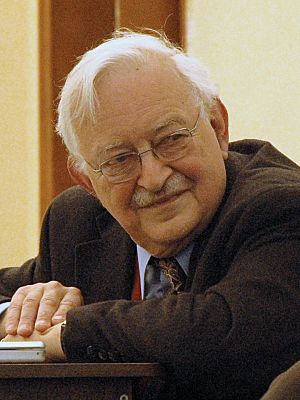Immanuel Wallerstein facts for kids
Quick facts for kids
Immanuel Wallerstein
|
|
|---|---|

Wallerstein giving a talk at a seminar at the European University at St. Petersburg in May 2008.
|
|
| Born | September 28, 1930 New York City, U.S.
|
| Died | August 31, 2019 (aged 88) Branford, Connecticut, U.S.
|
| Alma mater | Columbia University (BA, MA, PhD) |
| Known for | World-systems theory |
| Scientific career | |
| Institutions | Columbia University, McGill University, Binghamton University, École des Hautes Études en Sciences Sociales, Yale University |
| Thesis | The Emergence of Two West African Nations: Ghana and the Ivory Coast (1959) |
| Doctoral advisor | Hans L Zetterberg, Robert Staughton Lynd |
| Notable students | Georgi Derluguian, Michael Hechter, John R. Logan, Beverly J. Silver |
| Influences | Karl Marx • Vladimir Lenin • Rosa Luxemburg • Fernand Braudel • Andre Gunder Frank • Raúl Prebisch • Karl Polanyi • Joseph Schumpeter • Sigmund Freud • Frantz Fanon • Ilya Prigogine |
Immanuel Maurice Wallerstein (born September 28, 1930 – died August 31, 2019) was an American sociologist and economic historian. He is famous for creating the "world-systems approach." This idea helps us understand how different parts of the world are connected through history and economics.
Wallerstein was a Senior Research Scholar at Yale University from 2000 until he passed away. He also wrote regular articles about world events from 1998 to 2019. He was the 13th president of the International Sociological Association from 1994 to 1998.
Contents
About Immanuel Wallerstein
Early Life and School
Immanuel Wallerstein was born in New York City. His parents were Polish Jews who moved to New York from Europe. He grew up in a family that cared a lot about politics and world events. This made him interested in global issues from a young age.
He went to Columbia University for all his college degrees. He earned his bachelor's degree in 1951, his master's in 1954, and his PhD in 1959. He also studied at other universities around the world, like Oxford University.
From 1951 to 1953, Wallerstein served in the U.S. Army. After that, he wrote about McCarthyism, a time in American history when people were very worried about communism. This work helped him see himself as a "political sociologist."
In 1964, Wallerstein married Beatrice Friedman. They had a daughter named Katharine. He also became a stepfather to Beatrice's two children from a previous marriage.
His Career in Academia
Wallerstein started his teaching career at Columbia University in 1958. He supported students who were protesting the Vietnam War in 1968. In 1971, he moved to McGill University in Canada.
For about 20 years, Wallerstein focused on studying Africa. He wrote many books and articles about African politics and history. In 1973, he became the president of the African Studies Association.
In 1976, he got a special chance to lead the Fernand Braudel Center for the Study of Economies, Historical Systems and Civilization at Binghamton University. This center studied big social changes over long periods of history. Wallerstein was a professor there until he retired in 1999.
Throughout his career, Wallerstein taught at many universities around the world. He also led the Gulbenkian Commission on the Restructuring of the Social Sciences. This group looked at how social sciences should be studied in the future.
From 2000 until his death in 2019, Wallerstein was a Senior Research Scholar at Yale University. He received several awards for his important work, including the "Career of Distinguished Scholarship Award" from the American Sociological Association in 2003. He passed away in 2019 at the age of 88.
Wallerstein's Main Ideas
Wallerstein started by studying African countries after they became independent. But soon, he became known for his ideas about the global capitalist economy. He was a strong critic of global capitalism. He supported "anti-systemic movements," which are groups that try to change the current world system.
His most important work is a series of books called The Modern World-System. It came out in four parts between 1974 and 2011. In these books, he explained his ideas about how the world works.
The Modern World-System Theory
Wallerstein's main idea is that there is only one "world-system." This system is connected by a complex network of economic trade. He believed that the world is not made up of separate countries developing on their own. Instead, it's one big system where different parts depend on each other.
He said this modern world-system started in Europe and the Americas in the 1500s. It grew over time, and by the 1800s, almost every part of the Earth was part of this capitalist world-economy.
A key part of his theory is the idea of "core," "semi-periphery," and "periphery" areas.
- The core countries are like the powerful leaders. They have advanced technology and make complex products. Think of countries like the United States or Germany.
- The periphery countries are like the suppliers. They provide raw materials, farm products, and cheap labor for the core. Many developing countries are in this group.
- The semi-periphery countries are in between. They act as a periphery to the core (supplying things to the core) and as a core to the periphery (getting things from the periphery). Examples include countries like China, Brazil, and Mexico.
Wallerstein argued that there's an "unequal division of labor" between these areas. Core countries buy cheap raw materials from the periphery. Then, they sell expensive finished products back to the periphery. This makes the core countries richer and keeps the periphery countries less developed.
He also talked about the "commodification" of things. This means that natural resources, land, labor, and even human relationships can be turned into things that are bought and sold in a market.
Influences and Views
Wallerstein was influenced by many thinkers. From Karl Marx, he took the idea that economic factors are very important in global politics. He also used ideas like the difference between capital (money/resources) and labor (work).
He was also greatly influenced by the "world revolution" of 1968, which involved student protests around the world. He believed this event showed the end of "liberalism" as the main way of thinking in the modern world.
Wallerstein often said that the United States was a "hegemon (a leading power) in decline." This idea became more popular after the Iraq War. He also believed that the capitalist world economy was harmful to many people. While he once thought capitalism would be replaced by a socialist economy, he later said that the future system was unknown.
Key Terms and Definitions
Here are some important terms Wallerstein used:
Capitalist World-System
This is a global system where different societies are connected through a worldwide division of labor. It doesn't have one political center, like an empire. Instead, it's run by a global market economy. It's divided into core, semi-periphery, and periphery regions.
Core/Periphery
This describes the difference between developed and developing countries. The core refers to developed countries that are powerful and wealthy. The periphery refers to dependent developing countries. The core's power comes from its economic strength.
Semi-Periphery
These are states that are in the middle, between the core and the periphery. They benefit from the periphery through unequal trade. At the same time, the core benefits from the semi-periphery in the same way.
Quasi-Monopolies
This is a type of monopoly where there is more than one company providing a product or service, but not many. Wallerstein believed these don't last long because new companies will try to enter the market.
Kondratiev Waves
These are long-term economic cycles in the world economy, also called "supercycles." Wallerstein thought that big global wars often happen when these economic cycles are on an upswing.
Awards and Honors
Immanuel Wallerstein received many awards and honors for his important work:
- International Sociological Association Award for Excellence in Research and Practice, 2014
- N.D. Kondratieff Gold Medal, Russian Academy of Natural Sciences, 2005
- Career of Distinguished Scholarship Award, American Sociological Association, 2003
- Premio Carlos Marx 2003, Fondo Cultural Tercer Mundo, Mexico
- Fellow, The American Academy of Arts and Sciences, 1998
- IPE Distinguished Scholar, International Studies Association, 1998
- Gulbenkian Professor of Science and Technology, 1994
- Medal of the University, University of Helsinki, 1992
- University Award for Excellence in Scholarship, Binghamton University, 1991
- Officier, Ordre des Arts et des Lettres, France, 1984
- Sorokin Prize (for Distinguished Scholarship), American Sociological Association, 1975
- Fellow, Center for Advanced Study in the Behavioral Sciences, Stanford, 1970–71
- Ford Fellow in Economics, Political Science and Sociology, 1970–71
- Foreign Area Fellowship, Africa, 1955–57
- Phi Beta Kappa, 1951
See also
- Historical sociology
- Late capitalism
 In Spanish: Immanuel Wallerstein para niños
In Spanish: Immanuel Wallerstein para niños
 | Mary Eliza Mahoney |
 | Susie King Taylor |
 | Ida Gray |
 | Eliza Ann Grier |


